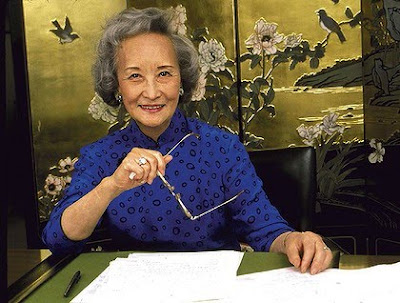It was actually April Lee of M.S.T.V. in Washington D.C., who informed me by email of Nien Cheng's passing. I am grateful for her kindness. My hero died at home, attended by loyal and loving friends, including Ms. Lee's mother. In an instant I did a Google news search. It was only two days after the death but I was astounded to see how scant was the news of a noteworthy death. I have waited a week for notices to accumulate, hoping to read some fresh anecdotes from her many admirers and friends. Sadly, my wait was in vain and it makes me a bit sour to see how many lazy flacks have gotten paid to plagiarize copy scraped from the web pages of two or three better newspapers.
 Nien Cheng - the eyes of a tiger. Anger and a deep sense of outrage kept her alive through years of torture and close surveillance by the Maoists.
Nien Cheng - the eyes of a tiger. Anger and a deep sense of outrage kept her alive through years of torture and close surveillance by the Maoists. Her birth name was Yao Nien Yuan and she was endowed with beauty, intelligence and a work ethic. She became a graduate of the London School of Economics, where she met her husband to be, Dr. K.C. Cheng. She became a diplomats wife when he was appointed, in 1941, the Second Secretary at the Chinese Legation in Australia. It was in Australia that their only child was born, a daughter they named Meiping. Postwar the Cheng's returned to China and would make careers with Shell Oil. Their fatal mistake, one common to many intellectuals of that era, was to give the Communist Party the benefit of the doubt.
Like her contemporary George Orwell, (another great hero of mine), Nien Cheng early in life had chosen to become a committed socialist. And like Orwell she was destined to receive a brutal education at the hands of "comrades". Orwell was denounced and relentlessly screwed over by ankle biters, but Nien Cheng suffered more. She was tortured in a Shanghai prison - subjected to the most bestial forms of coercive interrogation yet devised, and for more than six years. Her torturers, by the dozen, were never prosecuted, but that's another dossier.
 Nien Cheng with her beloved daughter Meiping, the budding actress who was murdered by Mao's Red Guards in 1967. [Washington Post photos]
Nien Cheng with her beloved daughter Meiping, the budding actress who was murdered by Mao's Red Guards in 1967. [Washington Post photos]After Madame Cheng was released from political prison, two extremely cold fish (members of a "Worker's Propaganda Team") appeared. Introducing themselves as spokesmen for the "Revolutionary Committee of the Shanghai Film Studio" they informed her that her daughter Meiping's name was on "the suicide list" at the studio, one of many actually murdered by Maoist Red Guards. "According to our Great Leader Chairman Mao, committing suicide is an attempt to resist reeducation and reform. It's a crime against Socialism." Much of the remainder of the book details Nien Cheng's tenacious hunt for the truth about her daughter's killers... another courageous blow for truth and justice by a heroic woman who simply could not be defeated by the black beast of authoritarianism.
The first line of Nien Cheng's memoir reads: "The past is forever with me and I remember it all." She has been a hero of mine since the first time I read her memoir - LIFE AND DEATH IN SHANGHAI (1986). I hope to read her inspiring book one last time before the clock strikes thirteen. You and I still have "that privilege", but for how long?
[I have shared thoughts on Nien Cheng a few times in the past, including one testy piece here in the blog. If you care to jump back two years, you can read the article here.]
Nien Cheng lived in Ottawa while waiting on the Americans to let her enter on her own terms. That's a story in itself. I see no evidence that any Canadian newspaper bothered to run her Obituary but at least a British paper, THE TELEGRAPH, mentioned the Canadian dimension to her story:

